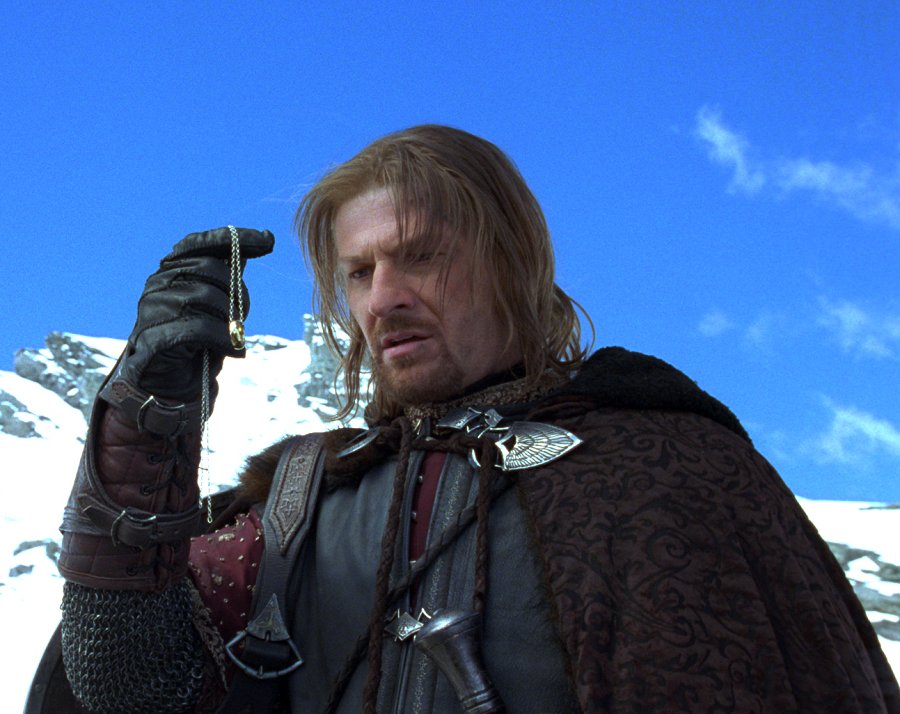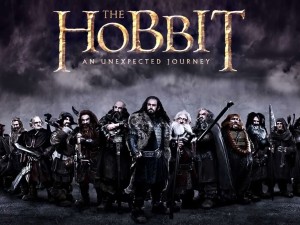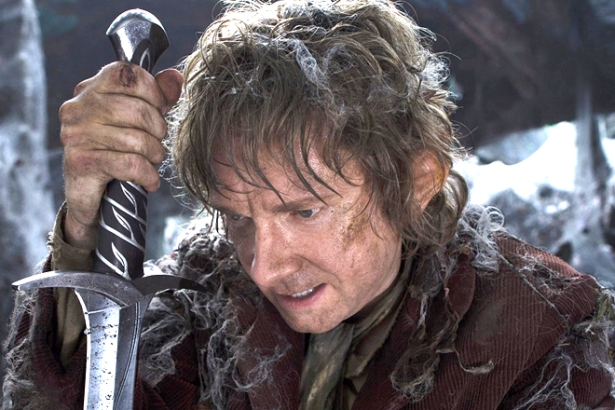I’ve written a couple of posts about ways in which Peter Jackson stumbles in his treatment of Tolkien. Basically, these criticisms come down to volume; Jackson tends to want to turn it all the way up all the time. Tokien’s a pretty slow-going — or, if you’d prefer, boring — writer in a lot of ways, and the slowness and the boringness is central not just to the form and experience of the novels, but to their themes. Tokien is someone who, like the Ents, wants to sit back in some wooded glade and tell you the names of everything. He likes being slow, he likes being boring — which is to say, there’s a lot of room in his adventure novels for the appreciation of the joys of having nothing in particular happen. The way his narrative continually stalls out is central to the novels’ rejection of violence — a rejection which is ambivalent, but in many ways determinative. Jackson can understand and rejoice in Tolkien’s battle scenes (as Tolkien does himself) but not in Tolkien’s various numerous nothing scenes. The films, therefore, are garish and loud and busy all through, embracing Tokien’s flash and fire and drama, but not his long, slow, Treebeard-like pauses.
There are a couple of instances, though, where I think Jackson’s version is better than Tokien’s. One of the most noticeable of these is in the character of Boromir.
In the Fellowship of the Ring (which I’ve just about finished reading to my son), Boromir — like most characters in the novel, with the exception of Frodo and perhaps Sam and Bilbo — is not given a whole lot in the way of subtle characterization. We learn that he is very strong and proud, and also that he’s strong and not especially trusting, nor, perhaps, trustworthy. He helps the company by plowing through snow with his body when they’re trapped on the mountain. He disagrees with Gandalf and Aragorn about the path the company should take. He boasts about Minas Tirith and the strength of men. And that’s kind of it. He doesn’t become friends with any of the company. For that matter, he doesn’t become friends with the reader. He’s a mighty, proud man, off there being mighty and proud, and then he tries to take the ring from Frodo like a dickhead, and then he dies mightily and proudly in battle. And overall it’s just hard to care that much.
The film, though, is quite different. In part, this is Sean Bean’s doing; he’s an incredibly charismatic actor, and he gives Boromir a jaunty, frat-boy, devil-may-care charm for which the book offers no textual warrant at all. But the writers, who commit many an atrocity to Tokien’s text, here also surpass him. There’s a wonderful scene where Boromir is teaching Merry and Pippin and (I think) Sam to swordfight in which they all end up together laughing and rolling on the ground. And there’s also a scene after they’ve left Moria, where the Hobbits are grieving for Gandalf’s death, where Boromir begs Aragon to give them a minute to recover themselves. In the books, his questioning of the leadership is almost always based on ignorance, or stubbornness; here, instead, it’s based on sympathy and care for his companions.
There are other little moments too. The writers split up Boromir’s speech at the end of the book; part of it, where he speaks of the ring as a little thing, and wonders why it holds such power over them, is delivered on the journey. The ring has come loose, and Boromir picks it up by its chain and gazes at it and addresses it, before handing it back to Frodo, cheerfully declaring “I care not!” as he ruffles Frodo’s hair. That “I care not,” in Tolkien (uttered when Frodo won’t show him the ring) comes across as sinister; a man trying to deceive. Sean Bean’s reading, though, sounds more like a man trying to deceive himself without even knowing he’s trying to deceive himself.
The earlier moment with the ring also makes it more responsible for Boromir’s corruption; it’s almost like it’s gunning for him. And the scene where he tries to take it from Frodo…again, in the book, Boromir was never all that pleasant to begin with, so it’s just an intensification of his unpleasantness. In the film, though, Bean manages to show Boromir’s corruption as the flip side of his virtues; his boisterous courage turned into aggression; his mercurial good cheer turned into petulance. It’s a virtuoso performance of a good man doing wrong.
The script also adds a level to Boromir’s character that is almost completely absent in the book; his relationship with Aragorn. In the book, the two men are mostly in sync; Boromir wants to go to Minas Tirith to aid the city, and Aragorn (as the returned king) plans to join him (though after Gandalf falls he worries he should go with Frodo instead). In the film, though (thanks no doubt to Peter Jackson’s need for more and more drama) Aragorn is deeply mistrustful of men (including himself), and wants nothing to do with the kingship. Boromir is at first resentful of Aragorn’s position (which will displace his father’s line of stewards), and angry at Aragon’s mistrust. But as he grows to know Aragorn, he changes — and as Aragorn grows to know Boromir, he changes too, drawing faith in men and rekindling his love of Minas Tirith from Boromir’s faith and love. At Boromir’s death, Aragorn vows, for the first time, to defend Minas Tirith — and Boromir, for the first time, pledges his loyalty. “I will not let our city fail,” Aragorn says, and Boromir repeats it with a kind of desperate satisfaction. “Our city…our city!” His final words — “I would have followed you, my brother; my captain; my king” — are, then, in many ways, the conclusion of a love story — a bittersweet consummation, with Boromir finally embracing the future he will never see. The scene always makes me cry…as opposed to his final words in the novel the Two Towers (“Farewell, Aragorn! Go to Minas Tirith and save my people! I have failed.”) which pretty much just makes me shrug.
It’s interesting, perhaps, that not only is the Boromir arc one of the few things that I think Jackson unequivocally did better than Tolkien, but it’s also one of the best things in the films, period. Jackson’s twitchiness and Hollywood instincts — his need to give Boromir something to do, his need to make a star appealing — get filtered through Sean Bean’s considerable skills and end up turning a dour nonentity into a nuanced character. If for Tolkien and more complicatedly for Jackson, Boromir’s strength turns to weakness, it’s nice to see Jackson, in this instance, turn his weaknesses to strengths.




